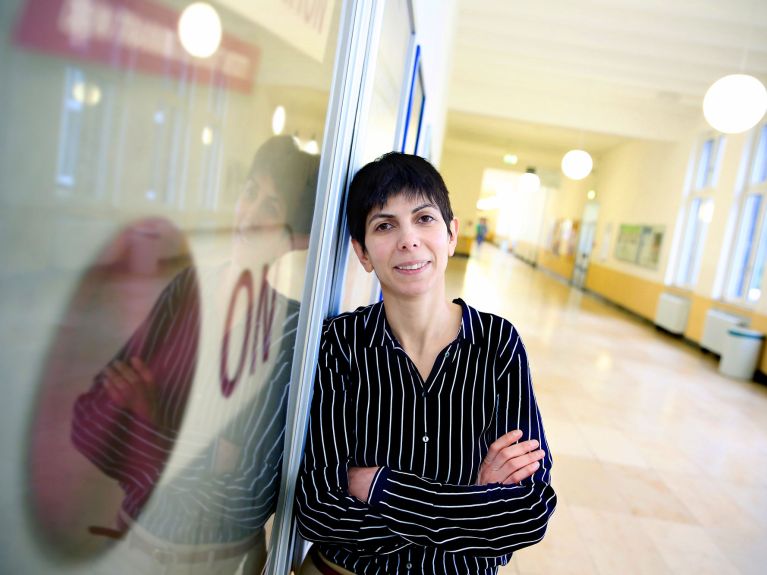Researching in safety
Lawyer Anan Al Sheikh Haidar fled from Syria and now teaches at the University of Cologne – as a fellowship holder of the Philipp Schwartz Initiative.

Human rights, civil rights, international law – these are the topics Syrian legal scholar Anan Al Sheikh Haidar focussed on at Damascus University. Secret service staff regularly attended her lectures, and she was under permanent surveillance. Anan Al Sheikh Haidar was one of the five opponents of the regime in her faculty, who were against Assad’s government and stood up for more democracy. Three of them were arrested, and Haidar has not heard from one of them since. “We were afraid the secret service would arrest us, too,” she says. Her husband Housamedden Darwish, a philosophy lecturer, was also under surveillance. He reported in Syria about the Arab Spring and occasionally went into hiding.
Escape from Syria
In 2014 the couple fled to Germany via Lebanon. During her husband’s interview at the University of Cologne she happened to hear about the Philipp Schwartz Initiative, a programme by the Alexander von Humboldt Foundation and the German Federal Foreign Office for academics who have fled their country. Professor Claus Kress, Director of the Institute for International Peace and Security Law at the University of Cologne, heard about the jurist and proposed her for a fellowship.
New start in Germany
Haidar was accepted and has taught at the University of Cologne since 2016. She lectures in English on international law and human rights, and her lectures are very popular amongst students. Which is why the university has promised her another position after her fellowship. In Cologne Haidar feels safe with her family for the first time since fleeing Syria. Despite occasional language barriers she manages well on an everyday basis, and feels she is in the right place, at home. “Our three-year-old son already speaks fluent German,” she says and laughs. “I’m happy that my family and I have a future here.”
Facts on the Philipp Schwartz Initiative
- The initiative provides German universities and research institutes with the funds to host threatened foreign researchers as Philipp Schwartz fellowship holders.
- The programme is named after Jewish scientist Professor Philipp Schwartz. In 1933 the pathologist fled Germany to escape the Nazis and founded the “Notgemeinschaft deutscher Wissenschaftler im Ausland” (Emergency Society of Scientists and Scholars Abroad) in Zurich.
- To date the Philipp Schwartz Initiative has awarded fellowships to over 120 threatened foreign researchers.
- The programme is funded by the Federal Foreign Office, several German foundations and the American Andrew W. Mellon Foundation.
- The Philipp Schwartz fellowship runs for a period of 24 months. It is also possible to extend the term by co-financing.
More about the Philipp Schwartz Initiative
